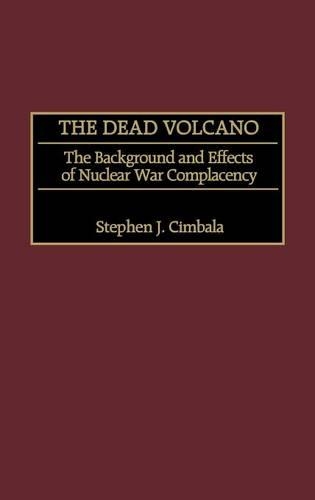
The Dead Volcano: The Background and Effects of Nuclear War Complacency
(Hardback)
Publishing Details
The Dead Volcano: The Background and Effects of Nuclear War Complacency
By (Author) Stephen J. Cimbala
Bloomsbury Publishing PLC
Praeger Publishers Inc
30th June 2002
United States
Classifications
Tertiary Education
Non Fiction
International relations
Nuclear weapons
General and world history
327.16
Physical Properties
Hardback
296
Description
Cimbala argues that nuclear complacency is based on a misreading of history and on unsound political and military analysis. The stability factors built into the Cold War international system are now missing. The spread of nuclear weapons after the Cold War moved toward regional actors outside of Europe, some with religious or national scores to settle. Technology transfer of ballistic missiles and other delivery systems for weapons of mass destruction, including biological and chemical as well as nuclear weapons, brings the danger of nuclear eruption closer to reality. Finally, the mechanism of deterrence that seemed so dependable as a means of war prevention from 1947 to 1991 only seems so by virtue of nostalgia. The early decades of the Cold War were made somewhat unpredictable by uncertain U.S.-Soviet political relations, by nuclear force building based on worst-case estimates, and by rickety command and control systems that could have failed both sides in a crisis. The Soviets and Americans gradually improved their relationship and stabilized Cold War competition, including nuclear rivalry, but they had more than 40 years to practice and no immediate territorial disputes. As Cimbala makes clear, it cannot be assumed that the Soviet-American nonbelligerence of the Cold War is transferable into a multipolar, post-Cold War international system marked by spreading weapons and trigger-sensitive control systems. This provocative analysis will be of interest to all scholars, students, and policy makers involved with defense, security, and foreign policy studies.
Reviews
"The book's strength lies in hypothetical facts and figures, and the chapter about the spread of nuclear weapons to countries outside the current nuclear family is quite relevent, since it is based on current world events... Dead Volcanp adds value to the defense community in its analysis of nuclear relations; something everyone should be at least familiar with and concerned about...[a]nyone with an interest in peace studies, foreign policy, or military affairs should read it."-Military Review
A respected and prolific political scientist and security policy consultant, Cimbala has produced yet another provocative book. The Dead Volcano is intended as a wake-up call to the dangers of "nuclear war complacency" that took hold after the Cold War. The first nuclear age of US-Soviet rivalry was menacing enough, but the superpowers managed their rivalry successfully and cooperated to prevent nuclear proliferation. But in this second nuclear age, regional rivals and rogues seeking nuclear weapons and long-range missiles pose serious threats that Western policy makers have not take seriously enough or have misunderstood, hence the continuing risk of nuclear war....Whether or not one agrees with this assessment, Cimbala's book, occasionally technical but not tedious, is not tendentious. It is meant for policy makers, think tankers, and academic specialists concerned about nuclear weapons, national security, strategy, and arms control. Strongly recommended for larger university libraries and collections specializing in international security, defense policy, military studies, and related fields. Upper-division undergraduates and above.-Choice
The book's strength lies in hypothetical facts and figures, and the chapter about the spread of nuclear weapons to countries outside the current nuclear family is quite relevent, since it is based on current world events... Dead Volcanp adds value to the defense community in its analysis of nuclear relations; something everyone should be at least familiar with and concerned about...[a]nyone with an interest in peace studies, foreign policy, or military affairs should read it.-Military Review
"A respected and prolific political scientist and security policy consultant, Cimbala has produced yet another provocative book. The Dead Volcano is intended as a wake-up call to the dangers of "nuclear war complacency" that took hold after the Cold War. The first nuclear age of US-Soviet rivalry was menacing enough, but the superpowers managed their rivalry successfully and cooperated to prevent nuclear proliferation. But in this second nuclear age, regional rivals and rogues seeking nuclear weapons and long-range missiles pose serious threats that Western policy makers have not take seriously enough or have misunderstood, hence the continuing risk of nuclear war....Whether or not one agrees with this assessment, Cimbala's book, occasionally technical but not tedious, is not tendentious. It is meant for policy makers, think tankers, and academic specialists concerned about nuclear weapons, national security, strategy, and arms control. Strongly recommended for larger university libraries and collections specializing in international security, defense policy, military studies, and related fields. Upper-division undergraduates and above."-Choice
Author Bio
STEPHEN J. CIMBALA is Distinguished Professor of Political Science at Penn State University (Delaware County). He has contributed to the literature of international security, defense studies, and nuclear arms control for more than 20 years. Cimbala recently published Nuclear Strategy in the Next Century (Praeger, 2000). He serves on the editorial boards of various professional journals and has served as a consultant to various agencies of the U.S. government and policy think tanks.
